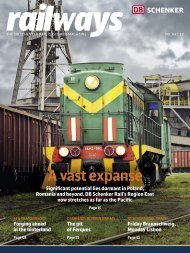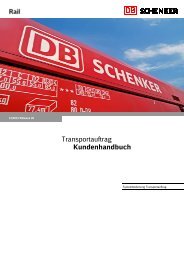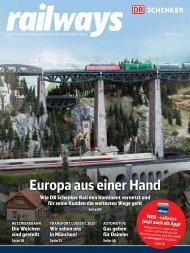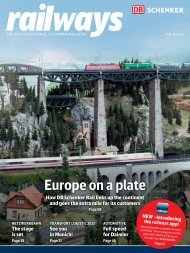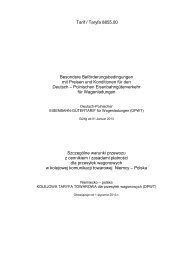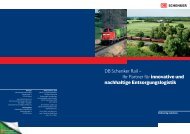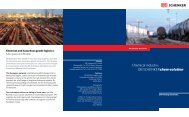PDF Download - DB Schenker Rail Deutschland AG
PDF Download - DB Schenker Rail Deutschland AG
PDF Download - DB Schenker Rail Deutschland AG
Create successful ePaper yourself
Turn your PDF publications into a flip-book with our unique Google optimized e-Paper software.
Ph otos: Saskia Stoehr<br />
just-in-time scrap<br />
<strong>DB</strong> <strong>Schenker</strong> <strong>Rail</strong> now offers an active inbound control system all over Germany<br />
for scrap logistics, following a successful pilot project with metallurgy<br />
company Hüttenwerke Krupp Mannesmann GmbH.<br />
Without scrap there can be no steel, as scrap<br />
iron is one of the most important and valuable<br />
raw materials for its production.<br />
“Without a regular supply of scrap, production here<br />
would grind to a halt,” says Peter Hase, Trade Representative<br />
for the Transport Department of Hüttenwerke<br />
Krupp Mannesmann GmbH (HKM).<br />
The steelworks processes almost a dozen different<br />
types of scrap. To optimise timely deliveries and<br />
ensure that this precious raw material is supplied in<br />
the necessary quantities and quality, last summer<br />
HKM and <strong>DB</strong> <strong>Schenker</strong> <strong>Rail</strong> <strong>Deutschland</strong> launched<br />
a pilot project in all scrap transport operations both<br />
within Germany and from Austria and Switzerland.<br />
The aim was to optimise transport processes, making<br />
them more transparent and traceable for the steelworks<br />
and for the logistics providers.<br />
Previously, supplies from the approximately 30<br />
scrap merchants were uncoordinated, they did not<br />
take account of capacities at the steelworks, and they<br />
peaked at the end of the month. Now inbound control<br />
takes place on a needs-oriented basis, and is<br />
performed by special material requirements planners<br />
(MRPs) at <strong>DB</strong> <strong>Schenker</strong> <strong>Rail</strong>’s customer service<br />
centre in Duisburg. They issue forwarders with incoming<br />
goods numbers, without which they cannot<br />
transport the scrap to the steelworks. The steelworks<br />
PILOT QUARTET (from left to right): Darius Kozuch (<strong>DB</strong>),<br />
Peter Hase (HKM), Ralph List and Jens Wilke (both <strong>DB</strong>).<br />
decides how many incoming goods numbers should<br />
be issued daily, thus allowing precise material requirements<br />
planning not just for wagon numbers,<br />
but also for scrap types.<br />
“Active inbound control has been completely accepted<br />
by everyone involved, and the benefits are<br />
plentiful,” says Peter Hase of HKM. “Wagon circulation<br />
is now considerably faster, and the supply of<br />
wagons has substantially improved.” This not only<br />
reduces costs but, most importantly, also ensures<br />
greater planning reliability for consignors and consignees<br />
alike.<br />
In addition to the pilot project with HKM Duisburg,<br />
Arcor Mittal Luxembourg and an Italian steelworks<br />
have now also been incorporated into the new<br />
logistics system. This year, the system will be expanded<br />
to take in a further 10 steelworks in Germany.<br />
rb<br />
contact | Ralph List,<br />
Tel. +49 (0) 203 454 2400 Ralph.List@dbschenker.eu<br />
<strong>Rail</strong>ways |<br />
19




